Conductor Michael Tilson
Thomas
A Second Conversation with Bruce Duffie
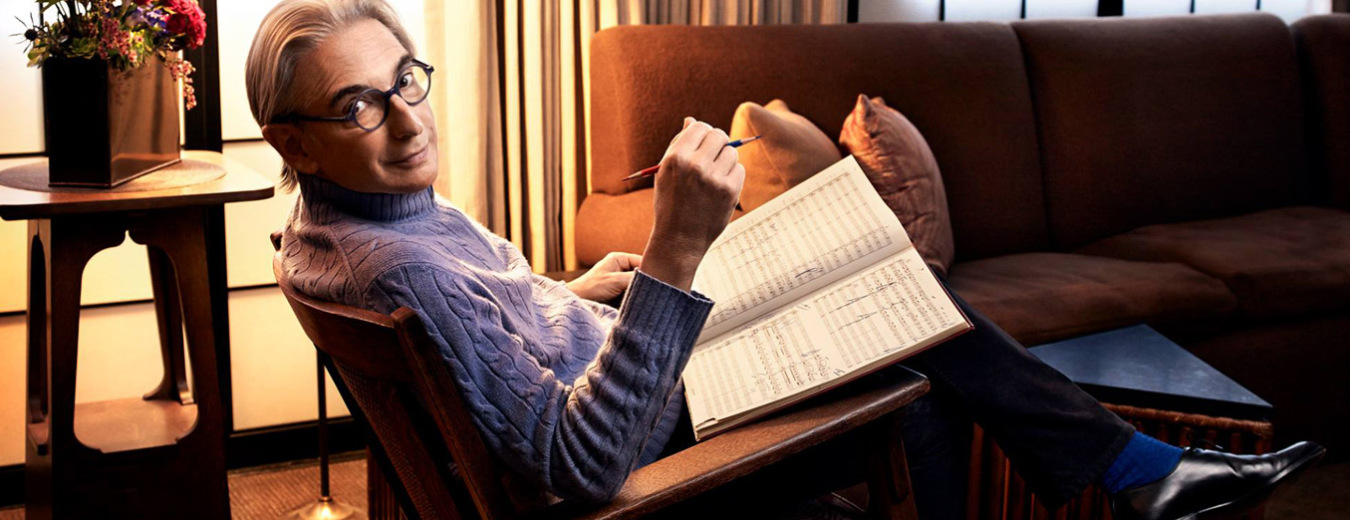
It has been my distinct pleasure to have met with Michael Tilson Thomas
on two occasions. The transcript of the first encounter, from November
of 1986, was published in Nit & Wit magazine, and can be seen
HERE.
On this webpage is our second meeting, from March of 1994, which took
place in one of the offices in the basement of Orchestra Hall (home of
the Chicago Symphony). On the wall was a painting of some buildings,
with musical notes over the scene. I remarked, facetiously, that
it could be Augenmusik [literally eye-music, or graphic notation],
and we both had a hearty laugh . . . . .
Bruce Duffie: Do you ever conduct anything that is Augenmusik?
Michael Tilson Thomas: I stay away from Augenmusik
these days, although at one time I had a fair amount of experience with
it.
BD: Especially with new music, how do you decide
which pieces you will spend your time on, and which pieces you’ll set aside
and let somebody else work with?
MTT: After a while, you have a track record with
a particular composer, and you know his work. You’ve maybe done his
pieces before, and so you look forward to a new piece with great expectation.
BD: But when an unknown comes to you, do you have
to actually look at the piece?
MTT: A big part of what I now have to do is look
at a lot of scores, many of them unsolicited. A committee of people
works on it with me to look at them, and see which scores seem to have particular
merit. We then try to figure out if there is an opportunity to read
these pieces [with an orchestra], and get some idea of what they’re
like. The mechanism of putting a piece onto a subscription concert
for a major symphony orchestra these days is an enormously daunting one.
There’s enormous pressure on the orchestra, because of the public and the
subscribers. The tempo and intensity of modern times is such that
to put on a new piece on a program, especially a vast piece, is a very serious
commitment.
BD: Is this why we have so many eight-minute
works?
MTT: It’s one reason. I want to emphasize
that I don’t take it lightly putting a new work on a program. It
is a real commitment for me. It must be a piece that I firmly believe
in, and feel has great communicative power. Otherwise, I wouldn’t
be doing it. I don’t believe in the philosophy of programming bitter
music that somehow is good for the soul to take in some time thereafter.
No, it has to have some immediate punch, some immediate communication.
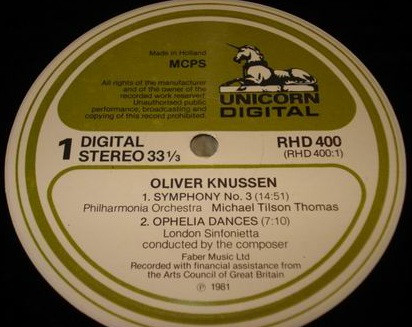 BD: This is what I’m trying to zero in
on. What kinds of things in the score will touch you?
BD: This is what I’m trying to zero in
on. What kinds of things in the score will touch you?
MTT: That’s too technical a question to discuss
now.
BD: Okay. The let me ask if you are pleased
with a lot of the music that you hear coming off the pages of new works
these days?
MTT: I’m very pleased with a great deal of new
music. There’s some great scores out there. Robin Holloway’s
Second Concerto for Orchestra, which has just been recently recorded
(by the BBC Symphony, conducted by Oliver Knussen),
is a spectacular piece. My God, it’s so inventive, so thrilling
and exciting, so full of humor and invention. (MTT would later
record Holloway’s Third Concerto
for Orchestra.) Pieces like Oliver Knussen’s Third (recording
by MTT shown at left), likewise are in this world of extremely eclectic,
difficult to classify, but nonetheless very rewarding music. Many
of the pieces that Lutosławski produced in the last years of life are
really sensational, and would definitely stand up. We seem to have
come past the years of dogmatic adherence to one particular stylistic
credo, and composers are becoming more free again to write music that
they really feel has something to say.
BD: Is that a good thing?
MTT: A very good thing, of course.
BD: What advice do you have for the composer, young
or old, who wants to write an orchestral work, or a chamber work?
MTT: [Thinks a moment] Don’t follow theories.
That’s my big advice to composers. Follow your own heart.
Follow your own voice. Write down what you think must be there.
BD: Follow your own theories?
MTT: I don’t think of music in terms of terminology.
I think of it in terms of a practice, which is the touch of the performers’
hands on the instrument, or the imagination of the composer delving in
and out of the dream world, shall we say, trying to bring portions of that
dream world back through the whole mechanism of notation. Ultimately,
the players’ fingers present it to people who are sitting in the audience,
but this need to communicate must be the thing that drives music.
It cannot be to demonstrate the velocity of an acoustic theory. It
cannot be to prove some numerical game of the periodicity of a system of
twelve or lesser or more numbers. It has to be about something coming
from the dream world into the real world with a purpose of communication.
BD: You did a little bit of composing in your own youth.
Does this make you more sympathetic towards new compositions, or even any
compositions?
MTT: I look at all music for a sense of its design.
As I look at the page, I’m trying to look beyond the notation, and
imagine what it is the notation may symbolize, what it suggests. I
know, from having written some music myself, that it’s ultimately impossible
to write down exactly what you have in mind, no matter how specific you may
try to be. Greater and greater notational complexity creates as many
problems as it solves, because beyond a certain point, the goal of a performance
becomes more or less to be congruent with what these scores suggests. In
this way, you have an aesthetic of acoustic templates in which somewhere
there’s a master performance that’s been carefully edited from something.
A live performance is measured against how exactly it can line up with that
master performance. That’s absolutely contrary to the whole history
of music. The nature of the pieces that have remained great classics
have remained so because they will admit to many different interpretations.
They have a universal message to present, which can be focused and presented
in quite a number of different ways. That’s why the pieces stick
around many hundreds of years. They’re still interesting to hear.
* * *
* *
BD: You’ve just come from a rehearsal of the Civic
Orchestra, which is made up of young musicians. Does your focus and
your expectation of the group change if it’s the Civic Orchestra or the
Chicago Symphony Orchestra?
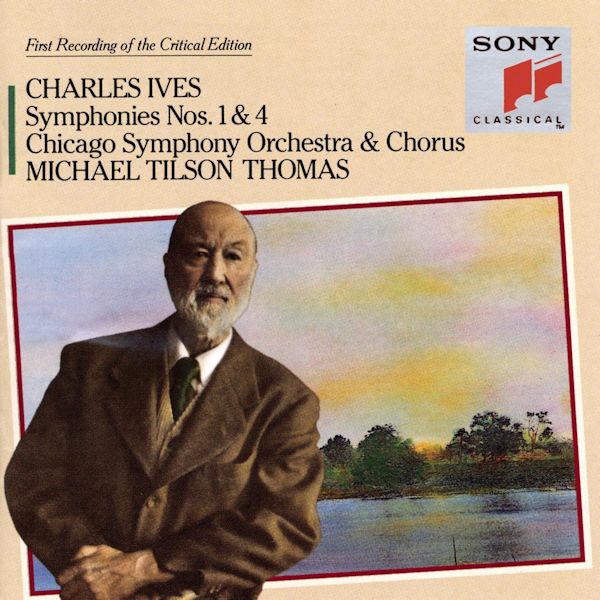 MTT: Of course it changes, because with
the Chicago Symphony I’m working, luckily, with a group that has an amazing
history, and an amazing richness of tradition. It’s a delightful
encounter each time to see each other. They play this with a certain
turn of phrase, and that’s very interesting. Now, when I do something
different, I wonder how we can together make a mixture of what our previous
assumptions of the piece may be.
MTT: Of course it changes, because with
the Chicago Symphony I’m working, luckily, with a group that has an amazing
history, and an amazing richness of tradition. It’s a delightful
encounter each time to see each other. They play this with a certain
turn of phrase, and that’s very interesting. Now, when I do something
different, I wonder how we can together make a mixture of what our previous
assumptions of the piece may be.
BD: So it’s much more of a collaboration than you’d
imagined?
MTT: I hope that music will always be a collaboration.
I don’t think it’s interesting to hear exactly your own ideas coming back
at you. It’s much more fun to work with an orchestra, and with a
soloist who have personalities. That way you discuss some aspect
of the music, and through their own spirit they make something new of the
ideas. So, the final idea is really a collaborative effort.
It’s the synthesis between your idea and their idea.
BD: When you’ve got four performances of a concert,
is the final idea the same at all four performances?
MTT: No, every night should be different.
BD: Do you purposely leave something for that spark
of the evening?
MTT: You don’t have to consciously leave something.
There will be something on the evening which will happen in a different
way, because all of us performers are different people when we are playing
for an audience. There is an electric charge in the air. There
is a sense of expectation, and there is a different sense of time and space
in that situation. It’s as if suddenly all the events of the piece
stand out in a kind of aural 3-D. Everything suddenly is very present,
and very significant. Things which may have rushed by in a thoughtful
moment of rehearsals, suddenly seem enormously important, and take an enormous
amount of time.
BD: You can’t predict any of this?
MTT: I wouldn’t want to predict any of it.
I rehearse very intently, and with the goal of establishing a certain mood,
a certain conception, and certain priorities. But the intensity of
the rehearsal is specifically to allow there to be great freedom in the
performance.
BD: Do you get enough rehearsal time?
MTT: Oh, yes.
BD: Do you ever get too much rehearsal time?
MTT: In Europe sometimes there’s too much rehearsal
time.
BD: Then do you work on something else, or do you
let them go?
MTT: Not in London, but in some of the orchestras
on the Continent, particularly the ones associated with some of the great
radio stations. You can sometimes have a situation where there really
is so much rehearsal time, that the work goes much more slowly because it
expands to occupy the amount of rehearsal time that there is.
BD: Do you feel you’re wasting any of the time?
MTT: No, but I sometimes wish that I could have
already done that concert. I am thinking of accomplishing other things,
and we’re still slowly putting together that event. Of course it’s
exactly the opposite here. The virtuosity of the Chicago Symphony
is that it can respond so quickly, and no matter how specific, or complex,
or demanding what it is that one may ask, it is totally possible for them
to do it, and to do it with an almost terrifying swiftness. So, it’s
really a question for any conductor doing a piece of standard repertoire
with an orchestra as great as this to think more of how ideally you would
like the music to feel. It’s not a question of adjusting mechanical
things within the orchestra. For example, it’s not technical matters,
but it’s more a question of comfortably finding together this mood of relaxation.
Then, suddenly a new group of instruments come in, and even though
they’re playing pianissimo, the music they’re playing is not actually dolce.
It’s actually quite animated, and perhaps even has a certain jeering
cast to it. That quality, that mood of this acerbic pianissimo is fun
to find.
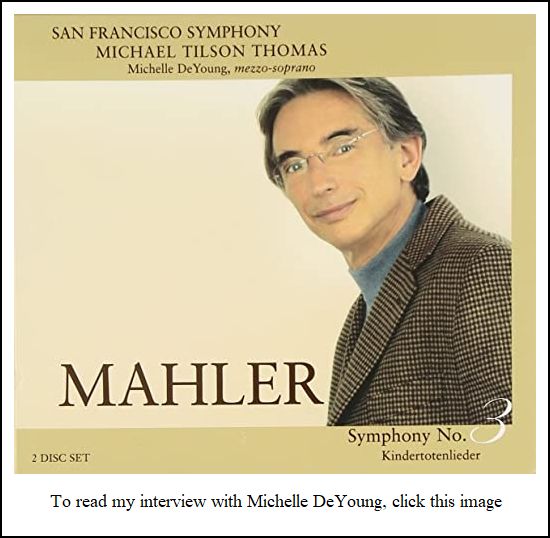 BD: How much of this is in the score, and how much is
in your heart?
BD: How much of this is in the score, and how much is
in your heart?
MTT: As I’ve said, the score is a suggestion of
what the composer wants, and in the case of Mahler, over the course of
his life he became much more specific about the kinds of things he wrote
into his symphonies.
BD: Is that because he was working conductor, and
knew the logistics of the rehearsal period and the performance practice?
MTT: That’s right. What’s so interesting
is that when he rehearsed other people’s music —
which after all was most of the time, and most of his career
was conducting other people’s music — he
rehearsed very systematically, but he did not actually mark the parts
for the orchestral players with anything like the detailed instructions
he used in his own music. You can actually see the sets of parts
that he used of Beethoven and Wagner and so on, in the Vienna Philharmonic
library. It’s almost as if he felt that he didn’t dare, he didn’t presume
to actually mark into the materials of a Beethoven or Brahms symphony,
or a Mozart opera. These kinds of very specific things he wanted
would have been a kind of profanation. He would work the people to
an absolute state of craziness, insisting that they play it on a particular
part of the bow, or that the tremolo be a certain speed, or that the fingering
be such and such, but he wouldn’t mark those things.
BD: And yet he re-orchestrated Beethoven and Schubert.
MTT: That’s right, he ‘retouched’ them, which is
the polite word for that. He ‘retouched’ things extensively, as many
people of that time did, but he did these things to make the ideas clearer.
One also has to remember that these ‘retouches’
were done for very specific halls and very specific orchestras.
It’s a mistake to look at some of these very idiosyncratic things that
Mahler did when he was in Budapest, or when he was working with the Vienna
Philharmonic, and think these apply to every orchestra, or every acoustical
situation. They don’t. In the Musikverein with the Vienna
Philharmonic of that time, they applied. For an orchestra in rural
Bohemia, or in some place in Hungary, they were not applied.
BD: So, if we want to re-create it, we should find
that instrumentation, and those instruments, and that number of players,
and put it in that hall to see if he was right?
MTT: For me, that would be too much in pursuit of
too little, because the most important thing in music is the notes themselves,
the expressive message that is contained in whatever style of music it may
be. For example, on the same program with this Mahler symphony, we’re
doing a piece by Steve Reich
called Three Movements, which is a wonderful piece, a delightful and
very, very expressive piece. Strangely enough, it is one with many
turns of phrases, particularly in its second movement, which remind me of
a movement of a Mahler symphony — slightly
Ländler-like, vaguely similar to a Jewish dance with serenade
steps, very nostalgic, turning back in on each other.
BD: Is this something you discovered when programming
them together, or is this why you put the two side by side?
MTT: It’s one reason I put these works on this
program. This particular piece is about twelve or fifteen minutes
long. Its title says it’s in three movements, and the outer movements
use the powers of a divided orchestra. It is actually a piece for
double orchestra, surrounding a continuo group of mallet instruments,
who keep very driving rhythmic figures going through the whole piece.
One side of the orchestra plays a particular rhythmic figure, which
then interlocks with the orchestra on the other side of the stage, and
produces between them a very, very bouncy kind of ping-pongy melodic contour
that rushes back and forth from one side of the stage and the other.
It’s quite delightful.
* * *
* *
BD: The music that we’re talking about, the music
that you conduct, is this music for everyone?
MTT: I don’t know who everyone may be. Classical
music itself is not music for everyone, despite the large audience that
classical music has. A great thing here in Chicago is listening to
this remarkable radio station. Relative to the number of people who
are listening to rap, or Latino music, or all sorts of pop music, or rock
music, and so on, it’s a smaller number of people, but it’s a group of people
who have discovered the message of a particular kind of music, and discovered
that classical music really is offering a lot more than just the diversion
of listening to music. What most top-forty music offers is a momentary
kick, a novelty of hearing a particular new tune, which, likely as not, is
more about the rhythm track and the various hooks and tricks that the arrangers
use to make it seem very hip. There is planned obsolescence in this
music. After a few weeks, Number One in the charts is no longer on
the charts at all, and the next thing you know we’re seeing it advertised
on television as part of a collection, “Not available
in stores. So, order now!” [Both laugh]
That all happens very, very quickly, whereas with classical music, we’re
dealing with music that, as part of its purpose, does not completely reveal
itself at first hearing. It presents many things which are attractive
and engaging, but somehow, over a longer period of time, it seeps into us.
It has a larger effect emotionally on us. It’s like what poetry does.
As we live longer, we start to understand more of what the piece says, and,
in some cases, what it doesn’t say also becomes very, very important. We
suddenly find that in a moment of crisis in our lives, or at a moment of
reflection, quite spontaneously a phrase of music may come to us, and we realize
that some part of ourselves has become woven into that music. That
music is just as important an experience for us as one of the major events
in our lives. It really has a history with us.
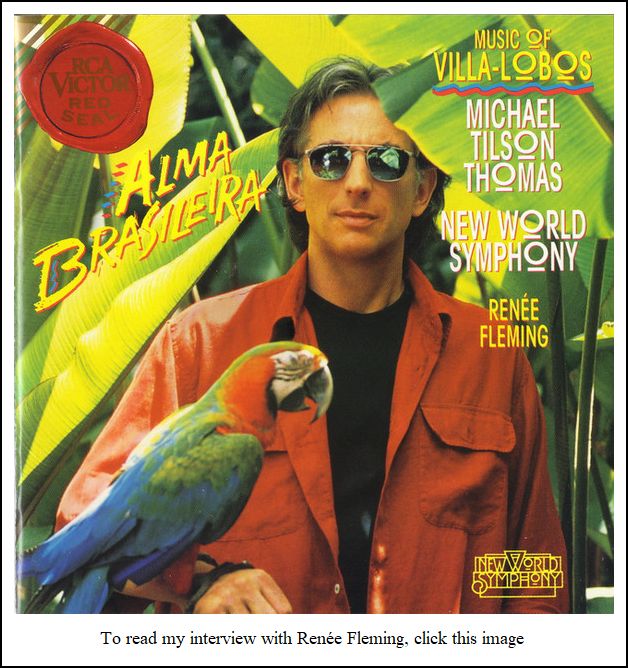 BD: Should we try to get more of the top-forty audience
listening to classical music?
BD: Should we try to get more of the top-forty audience
listening to classical music?
MTT: Of course. It’s a very important process.
In recent years in the United States, the whole issue of arts education
and music education has been largely abandoned, so it remains now for
orchestras everywhere to take up the cause of audience development. But
we shouldn’t be frightened of this. This is something which was part-and-parcel
of the creation of the great orchestras in the United States in the first
place. When you read about Theodore Thomas’s work here in Chicago,
it’s very much a story of reaching out to the people, making them aware that
this music was great, and interesting them in programs. At first, they
had small samplings of a lot of different kinds of music, and accustomed them
to the language of a particular composer, so that in the end it was the audience
itself that wanted to hear the whole piece. Then they wanted to hear
more works by some of the master composers. We have to realize that
audience-development is like the quest for better education, or the war on
poverty — it’s never going to be won,
but it must always be fought. We always have to get the message out
there, and make sure that this quality music really gets through to the
widest number of people who, in childhood, might find a sensitivity and
interest in it.
BD: Is this part of your aim with the New World
Symphony that you have in Miami?
MTT: It is part of the aim in the sense that the New
World Symphony is not just there to train musicians who have a knowledge
of the repertoire and are technically able to fill the ranks of great orchestras
around the world, but also to focus people on their reasons for being
musicians. Often it can be that young musicians have pursued their
whole careers in music to please other people. Perhaps they played
music originally to please their parents, and they worked to please their
teachers, then they worked to fulfill the requirements of a particular curriculum.
They can suddenly come through all of that, and really wonder what they are
going to do with all of this musical knowledge that they’ve gathered.
They also wonder what sort of life there is out in the world.
BD: Life after commencement.
MTT: Yes. Is it in an orchestra? Is
it in chamber music? Where is it? What is it? It’s terribly
important when you go into music that you swear, at least to yourself,
a kind of Hippocratic Oath, because you can’t know at the beginning of your
career, no matter how talented you are, exactly what breaks you’re going
to get. It can be a very rewarding life, or it can be a very frustrating
life. But if you truly have a desire, if you truly have the need to
make music every day, if that’s your compulsion, if that’s your obsession,
then you can be happy because you can find a life in which you do have the
opportunity to play music. Then the question for you is if you’re making
good music. It’s not so important whether you are making great music
in one town or another town, or at a university or in a chamber ensemble,
or in an orchestra or as a soloist. There are joys of music to be had
in all of those situations if you are of a mind to appreciate it. You
can see in the ranks of musicians some people who are really joyous and transfigured
by their life-long devotion to music, and other people who, in the very same
situation, are very unhappy and embittered by this same life of music that
they’ve experienced.
BD: Because they haven’t achieved what they expected?
MTT: Because they were perhaps expecting things which
were unrealistic, or maybe didn’t have quite that same devotion of the process
of actually making music itself. Maybe the music for them was a means
to an end, to achieve something else which perhaps didn’t work out.
It’s terribly important that, from the very beginning, we examine that music-making
is meant to be a joyful experience, and something in which one delights
in communicating with other people. It is the most effective way
we have as musicians to reach other people.
BD: Not too long form now you’re going to hit the
big Five-Oh. Are you at the point in your career that you expected
to be, or want to be?
MTT: I don’t think about my career much. [Laughs]
Because of the frustration of some of the marriages I’ve worked with
at times in my life, I really think about musical adventure. I think
about whether, on some level or another, I’m taking a piece further forward,
or discovering an era of music which I didn’t previously know, or do a little
bit of writing myself for uncovering something new. That’s what’s
the most important for me — the adventure
of it. I get frustrated if I feel I’m repeating the same things.
BD: You’re also about to take over the San Francisco
Symphony. What are your expectations of the west coast?
MTT: This is a great joy for me because I’m returning
to the west coast from whence I came. A lot of my perspectives were
shaped very much by growing up there, and being involved in the new music
scene. There is the greater closeness to Asian music, and World music,
which has always been very much a part of the perspective of the west coast,
and I hope to coalesce a great deal of that tradition in my new position
in San Francisco. I will not only be able to continue playing lots
of international music, I will play masterpieces, and doing lots more with
the orchestra in all the great music centers. I will also really
be trying to examine what is of essence in the American music tradition,
and, particularly, what contributions from the west coast made to that history.
It’s extraordinary to be in Europe — in
Holland and Germany or England — and
be aware of passionately interested young musicians, young Europeans who
are into American music. I really believe that in the next century,
American music will be of central influence that Russian music was in
the twentieth century, with the sense of so many romantic musical ideas, adventurous
new music ideas, the whole folklore of it underneath the surface of it.
America is poised to be all of that. We have some symphonic music,
solo music, chamber music, and we also the incredibly rich vernacular of
musical history with all these cultures of pop music, and patriotic music,
and dance music, and folk music. It’s all there, and people are mightily
interested in it worldwide. If you consider the influence of American
music in total, it is the dominant music of the entire world through pop
music, through electronic reproduction in music, and through technology.
It is the world’s musical culture.
BD: But it seems that the symphonic music and the chamber
literature from America is almost on the periphery of that.
MTT: What’s going to happen is that more people will
be listening through the hooks and devices of the pop music, and will wonder
about the source of all of it. Is there something that’s speaking
in a voice that we want to listen to for not just a week but maybe for
years, or even for our whole lives? There will be all this wealth
of music of Ives, Copland, and all the American masters. There are
some great American masters who wrote only three or four pieces which really
stand up in that way, but are unquestionable masterpieces. It doesn’t
make any difference, but those three or four unquestionable masterpieces
are great contributions to the world.
BD: Thank you for coming back to Chicago, and for speaking
with me again.
MTT: Thank you.
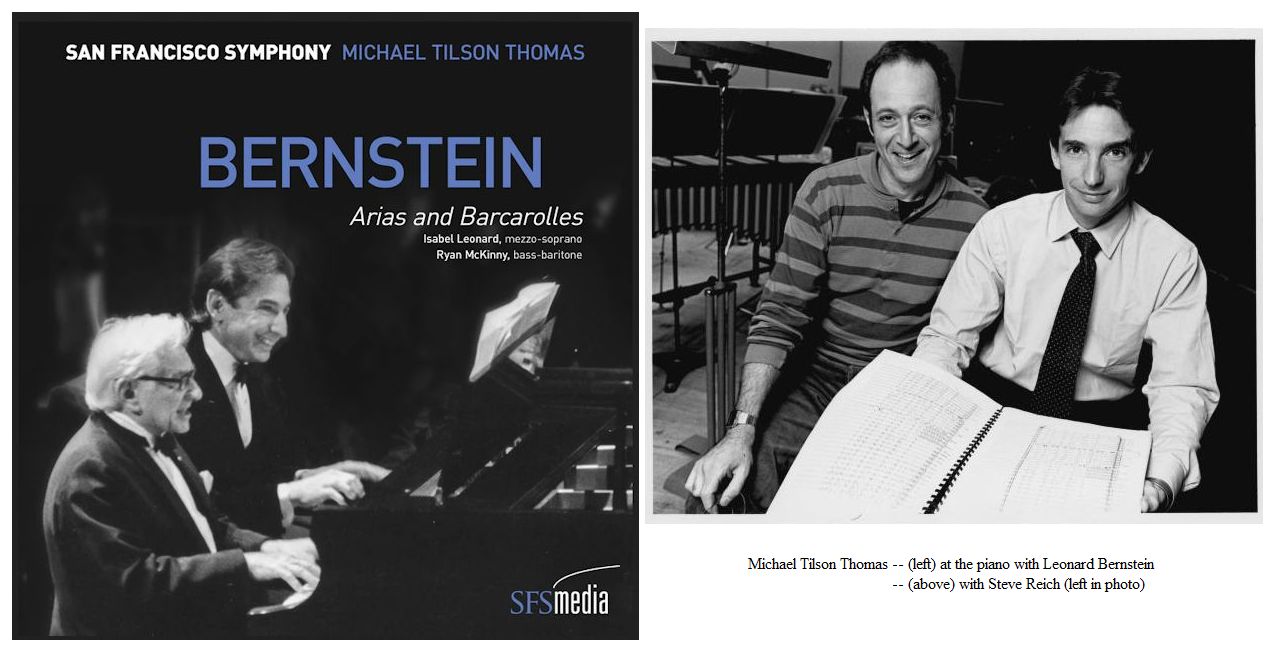
© 1994 Bruce Duffie
This conversation (my second with MTT) was recorded in Chicago on
March 28, 1994. Portions were broadcast on WNIB in December of that
year, and again in 1999; on WNUR in 2007, 2010,
and 2018; and on Contemporary Classical Internet Radio in 2008, and 2011.
A copy of the unedited audio was placed in the Archive of Contemporary
Music at Northwestern University, and in the Oral History of
American Music archive at Yale University. This transcription
was made in 2020, and posted on this website at
that time. My thanks to British soprano
Una Barry for
her help in preparing this website presentation.
To see a full list (with links) of interviews which have been transcribed
and posted on this website, click here.
Award -
winning broadcaster Bruce Duffie was with
WNIB, Classical
97 in Chicago from 1975 until its final moment
as a classical station in February of 2001. His
interviews have also appeared in various magazines and journals
since 1980, and he now continues his broadcast series on WNUR-FM.
You are
invited to visit his website
for more information about his work, including
selected transcripts of other interviews, plus a full
list of his guests. He would also like to call your
attention to the photos and information about his grandfather,
who was a pioneer in the automotive field more than a century ago.
You may also send him E-Mail
with comments, questions and suggestions.


 BD: This is what I’m trying to zero in
on. What kinds of things in the score will touch you?
BD: This is what I’m trying to zero in
on. What kinds of things in the score will touch you? MTT: Of course it changes, because with
the Chicago Symphony I’m working, luckily, with a group that has an amazing
history, and an amazing richness of tradition. It’s a delightful
encounter each time to see each other. They play this with a certain
turn of phrase, and that’s very interesting. Now, when I do something
different, I wonder how we can together make a mixture of what our previous
assumptions of the piece may be.
MTT: Of course it changes, because with
the Chicago Symphony I’m working, luckily, with a group that has an amazing
history, and an amazing richness of tradition. It’s a delightful
encounter each time to see each other. They play this with a certain
turn of phrase, and that’s very interesting. Now, when I do something
different, I wonder how we can together make a mixture of what our previous
assumptions of the piece may be. BD: How much of this is in the score, and how much is
in your heart?
BD: How much of this is in the score, and how much is
in your heart? BD: Should we try to get more of the top-forty audience
listening to classical music?
BD: Should we try to get more of the top-forty audience
listening to classical music?